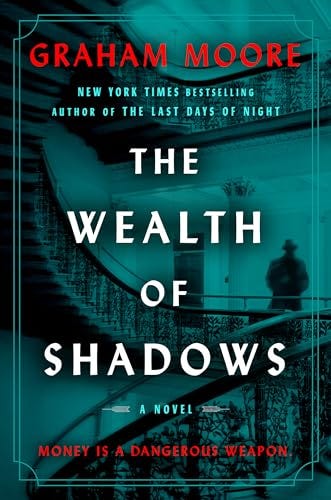Wars Are Not Just On Battlefields
The Historical Fiction Book “The Wealth of Shadows” by Graham Moore.
Reviewed by Guest Contributing Writer Marc S. Friedman
“The Wealth of Shadows” is a captivating tale of courage, intelligence, intrigue, and espionage.
Graham Moore, the Academy Award-winning screenwriter of "The Imitation Game" and bestselling author of "The Last Days of Night," delivers a remarkable new work of historical fiction.
The novel chronicles a small, secretive group of economists and a Midwestern tax lawyer housed deep within the U.S. Treasury Department. Their mission: to defeat Germany by crippling its ability to purchase military hardware and to prevent it from acquiring critical raw materials like cotton.
In 1939, Ansel Luxford, a successful tax attorney from St. Paul, Minnesota, was increasingly disturbed by the Third Reich's aggressive actions. He decided to give up his lucrative law practice and move to Washington, DC, with his wife, Angela, and young child to join the war effort.
Luxford viewed this as a noble calling. He joined a handful of economists led by the enigmatic Harry Dexter White in the nondescript “Research Department.” Together, they pioneered a new form of warfare—economic warfare—using currency as their primary weapon.
The story takes numerous unexpected twists as Luxford, White, and their team explore various ways to cripple the German economy. Their strategies included persuading neutral nations in South America and elsewhere to stop selling raw materials to Germany.
The U.S. froze all German and Axis-controlled assets in American banks. No German assets, including its gold reserves, could be sent back to Germany. Despite their efforts, the “Research Department” mistakenly believed Germany would not start World War II but correctly predicted that Germany could not win a war.
Luxford and White faced many challenges, one of which was the renowned British economist John Maynard Keynes. In discussions about post-war planning, White advocated for the U.S. dollar to become the international currency, while Keynes proposed a new currency, the “Bancor.”
Their intense debates often delved into monetary theories from ancient times to the 1940s. While some readers might find these discussions tedious, I found them fascinating.
Another surprising development involved Luxford’s brilliant wife, Angela, who worked as a typist in the FBI. She discovered that the Soviet Union had planted a spy within Luxford’s “Research Department.”
This spy was reporting the secret plans to the Soviets, who, at that time, were allied with Germany. As Moore notes, there is some doubt about the existence of this spy, but he concludes it was likely. I leave it to the reader to uncover the spy's identity.
Despite their disagreements, Keynes and White agreed on the necessity of an international currency to prevent future wars. They compromised on the gold standard, which was then adopted. It is noteworthy that nearly 80 years since the end of World War II, there have been no further worldwide conflicts, a development arguably due to the global currency compromise reached by Keynes and White.
Having read many books about World War II, including “Agent Zigzag” and “Operation Mincemeat” by Ben Macintyre, “Bodyguard of Lies” by Anthony Cave Brown, and “The Greatest Generation” by Tom Brokaw, I found that “The Wealth of Shadows” offers a unique perspective.
Wars are fought not only on battlefields but also with currency. Moore poignantly summarizes this theme near the book’s end, noting:
“[t]his had always been a war not just of armies but of currencies.”
The reader will learn why this was true.
“The Wealth of Shadows” is an enthralling, entertaining, and educational journey. It explores the hidden power of money and the deceit necessary to combat evil and win wars.
This fascinating tale of victories, defeats, adventures, and exploits of an extraordinary group of people who contributed to the collapse of the German economy and the defeat of the Third Reich is a page-turner the reader will not soon forget
Mr. Friedman was a trial lawyer for five decades. He received a B.A degree in Philosophy from The Johns Hopkins University and a Juris Doctor degree, with Honors, from The George Washington University Law School.
Since January of 2020, Great Books, Great Minds has provided subscribers community, connection and conversation around books for free—no paywall. But our future relies on you. At $6.00/month or $60.00 per year, please help us sustain our vision of impacting one million readers worldwide by 2030.
Diamond Michael Scott, Global Book Ambassador and Influencer







